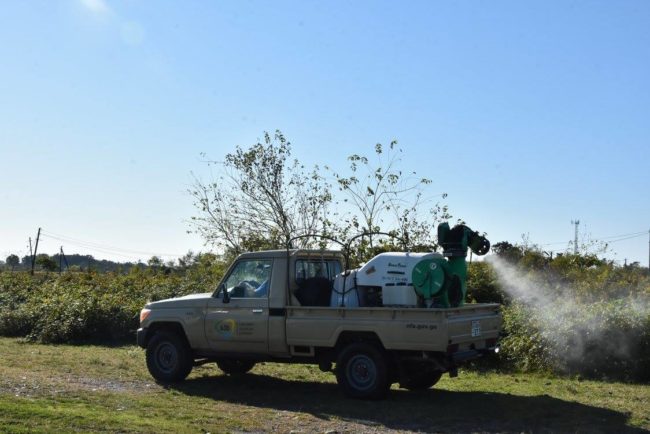
 After devastating crops in western Georgia, a dangerous agricultural pest — the stink bug — has spread to Tbilisi, Georgia’s National Food Agency (NFA) has confirmed.
After devastating crops in western Georgia, a dangerous agricultural pest — the stink bug — has spread to Tbilisi, Georgia’s National Food Agency (NFA) has confirmed.
The first widespread reports of the bug in Tbilisi appeared on 9 October, after which the NFA confirmed that the bug has reached the Georgian capital.
The brown marmorated stink bug first appeared in Samegrelo (Mingrelia) and Guria in western Georgia in 2015 where it devastated several kinds of crops, particularly hazelnuts, leaving largely hazelnut-dependent locals in limbo. It later spread to the broader territory of western Georgia, including Imereti and Adjara. According to the Abkhazian authorities, the bug has also spread to roughly 80% of Abkhazia.
[Read on OC Media: Stink bug devastates hazelnut crops in Samegrelo and Abkhazia]
The bug has forced several kindergartens in Batumi to close. Starting from 16 October, a number of kindergartens in Batumi will be closed for three days while the buildings are disinfected.
The NFA has repeatedly advised against the use of chemicals to fight the bug in houses, instead calling on the public to kill the bugs manually.
According to Paata Imnadze, the deputy head of the National Centre for Disease Control and Public Health, the bug is not dangerous to human health, but a person may develop allergy towards it.
The NFA has warned that stink bug populations migrate towards houses and urban territories in the wake of a temperature drop. They Agency has promised to give away 1 litre each of anti-stink bug pheromones to 230,000 families. They also promised to place pheromone traps in Tbilisi.
Giorgi Kakauridze, deputy finance minister, said in Parliament on 12 October that ₾4 million ($1.6 million) would be allocated to fight the bugs from the 2018 state budget. The opposition criticised the plan, saying the amount was insufficient to resolve the problem. Kakauridze responded that the United States Agency for International Development (USAID) was ‘actively engaged in the programme against the bug’, and if necessary, funding from the state budget could be increased.
For ease of reading, we choose not to use qualifiers such as ‘de facto’, ‘unrecognised’, or ‘partially recognised’ when discussing institutions or political positions within Abkhazia, Nagorno-Karabakh, and South Ossetia. This does not imply a position on their status.




 13 October 2017
13 October 2017


